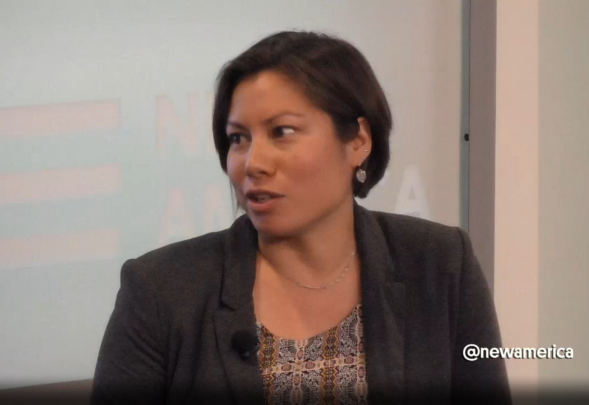Just three months ago world leaders representing nearly 200 countries gathered in Paris and agreed to the world’s first-ever global climate deal. By far the most ambitious of the goals outlined in the agreement is to prevent the increase of the global average temperature above 2 degrees Celsius. To do so, developed countries must dramatically reduce carbon emissions.
The need for “urgent and concrete action” to cut greenhouse-gas emissions demands that we explore new and old energy alternatives. Future Tense—a partnership of Slate, New America, and Arizona State University—took this opportunity to investigate the potential role of nuclear power in meeting the goals of the Paris accords in an event in Washington, D.C., on Feb. 22.
Nuclear power’s opponents point to events like the nuclear meltdown at Three Mile Island in 1979 and the Fukushima disaster in 2011. But nuclear is and has been a significant and reliable contributor to energy production. As Robert Hill, technical director of nuclear energy R&D at Argonne National Laboratory, reminded the audience, “approximately 11 percent of the world-wide electrical energy is produced by nuclear—that is 20 percent in U.S. [and] as high as 70 percent in France.”
The speakers who joined Hill in the conversation, moderated by Quartz Washington correspondent Steve LeVine, were similarly unfazed by the narrative of disaster. They chose to explore the more practical pros and cons of updating the technology to meet the world’s need for carbon-free energy.
Aaron VanDevender, principal and chief scientist of the San Francisco–based venture capital firm Founders Fund, emphasized the promise of innovative new designs of nuclear reactors. His firm invests in the nuclear energy startup Transatomic Power, which is developing an “advanced molten salt reactor that generates clean, safe, proliferation-resistant, low-cost nuclear power,” as described by Transatomic Power’s website. Designs like Transatomic’s attempt to solve existing problems with older generations of nuclear reactors, but they may not be able to compete in the market for clean energy that has become dominated by more cost-effective renewables such as solar and wind.
In order for nuclear to be a viable option, Joseph Romm, founding editor of ClimateProgress.org and senior fellow at the Center for American Progress, argued that we’d have to see something unprecedented in the history of technology development in the large-scale energy market. A wholly new type of reactor would have to be put on the market with its cost of power at 50 percent of the market value cost of the best alternatives already on the market today.
According to Romm, “If you want [to limit warming to] two-degree[s] Centigrade, if you want to avoid catastrophic global warming, you have to go flat-out deploying every affordable, practical, low-carbon technology that exists today. And there are a lot of them, and nuclear is one of the pricier ones.” Nevertheless, Romm said that it is important to keep existing reactors online while pursuing next-generation reactors, regardless of the likelihood of them meeting market demands. The pressure to meet the goals outlined in the Paris accords requires that each nation take immediate steps to bring their carbon emissions down to zero. Taking existing reactors offline or abandoning the promise of new innovations in nuclear technology will not bring us closer to these goals.
Many of the speakers in the conversation agreed nuclear may not be the best option for carbon-free energy, but it is nevertheless a resource that could be harnessed to meet our goals outlined in the Paris agreement. So the question was posed, “Can you be an environmentalist without embracing nuclear energy?”
Jennifer Richter, assistant professor in the School for the Future of Innovation in Society and School of Social Transformation at Arizona State University, answers yes, citing that “people are thinking from their own space of rationality.” Richter also noted that hitting the Paris goals is much more complicated than choosing the right technology to employ. Our future instead rests in our ability to govern the emerging technologies that we will deploy to meet our new goals.
